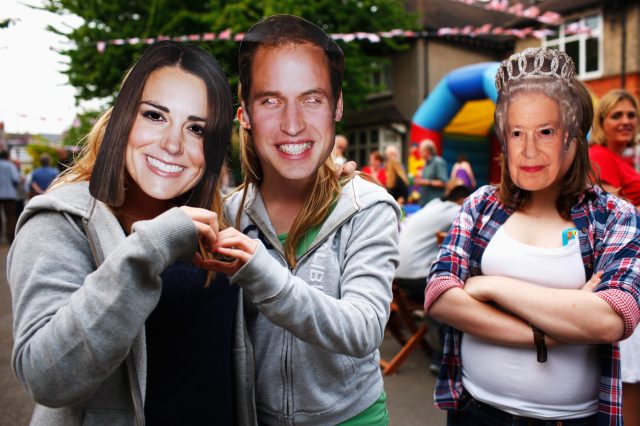Celebrating the royal wedding. Credit: Mark Thompson/Getty Images

Communitarian versus cosmopolitan, young versus old, liberal versus conservative, haves versus have nots, city versus rural and small-town Britain: all sorts of fissures have opened up across our land over recent years.
They’re the consequence of fundamental disagreement over how we see ourselves as a nation and the kind of future we desire. Contrary to popular belief, Brexit was not the cause of our current polarisation; rather, it was the most powerful manifestation yet of something much more deep-rooted and long in the making, an eruption of anger that had been building for years.
One of the most pronounced schisms is that between, on the one hand, our big urban centres, populated by large numbers of students and the liberal cosmopolitan middle-classes with their globalist outlook, and, on the other, an accidental alliance between our old industrial working-class towns and the conservative suburbs and shires – a coalition likened by the commentator David Goodhart to ‘Gavin and Stacey’ for its embodiment of a ‘benign independent-mindedness and pride in place that infuses two Brexit heartlands: Essex and ex-industrial South Wales’. Insightful, indeed.
In UnHerd’s poll of every British constituency on support for the Royal Family, this divide between our cities and the rest of the country is illustrated once more — and strikingly. Respondents were asked to what degree they agree with the statement: “I am a strong supporter of the continued reign of the Royal Family.” The results demonstrate that the monarchy continues to enjoy a healthy degree of support among the electorate, with 48% agreeing with the statement, 25% disagreeing and 28% not sure. But drill down a bit and the data becomes altogether more fascinating.
The 10 most supportive constituencies are spread across the English shires and suburbs (two are technically in London, but these are very much part of its small-c conservative suburban outskirts, once part of Kent and Essex, and most definitely not the trendy, cosmopolitan metropolis). Of the 10 least enthusiastic, not one was outside of our major cities — Liverpool, Manchester, Sheffield, Birmingham and London all feature.
The two Islington constituencies, North and South, heart of liberal elite territory and represented in parliament by Jeremy Corbyn and Emily Thornberry respectively, are among the 75 least royalist of the 633 constituencies polled, as are the London constituencies represented by Diane Abbott and Sir Keir Starmer. Brighton Pavilion, represented by the only Green MP Caroline Lucas, is at 610 on the list.
And, sure enough, attitudes to Brexit loom large, even on an apparently unrelated question such as this. All 10 most royalist constituencies voted Leave in the 2016 referendum, while — you’ve guessed it — all but one of the ten least royalist voted Remain. Thus, it would perhaps be wrong to present this as a crude monarchist versus republican divide.
While it may be true that large parts of the populace have become so disillusioned at being routinely treated with contempt by a tin-eared parliament that they are willing to invest their faith instead in alternative public institutions such as the Royal Family, the poll results also speak to the underlying — and widening — general cultural schism between our cities and everywhere else.
Intriguingly, of all Labour constituencies, support for the Royal Family is highest in Dagenham and Rainham. Having grown up in the area — and though no great fan of the monarchy myself — I think I can explain this. Citizens in places such as Dagenham and Rainham don’t see themselves particularly as political monarchists; instead, for good or bad, many associate the Royal Family with the cultural values they themselves often hold dear: patriotism, custom, tradition, duty, social stability.
This is not a unanimous position among the working-class, of course. Far from it. And one might well ask why some of the poorer sections of our citizenry feel any special fondness at all for an aristocratic (and often deeply flawed) family blessed with the type of wealth and privilege of which they could only dream. But, like it or not, they see the institution of monarchy, and particularly the Queen, as embodying some of the things about their country of which they were once rather proud.
And amid the maelstrom of rapid and deep-seated social and cultural upheaval, the steady constancy of their monarch provides something of a mooring. And as a result, working-class affinity for the monarchy still holds firm in some areas. Needless to say, Dagenham and Rainham voted overwhelmingly for Brexit.
The poll results, though ostensibly about the Royal Family, highlight something more profound about our country. They illustrate the extent to which we have tipped into a very real cultural war, with competing values and priorities vying for ascendancy. Much of our political discourse and debate must now be seen through this prism. We had better get used to it.










Join the discussion
Join like minded readers that support our journalism by becoming a paid subscriber
To join the discussion in the comments, become a paid subscriber.
Join like minded readers that support our journalism, read unlimited articles and enjoy other subscriber-only benefits.
Subscribe